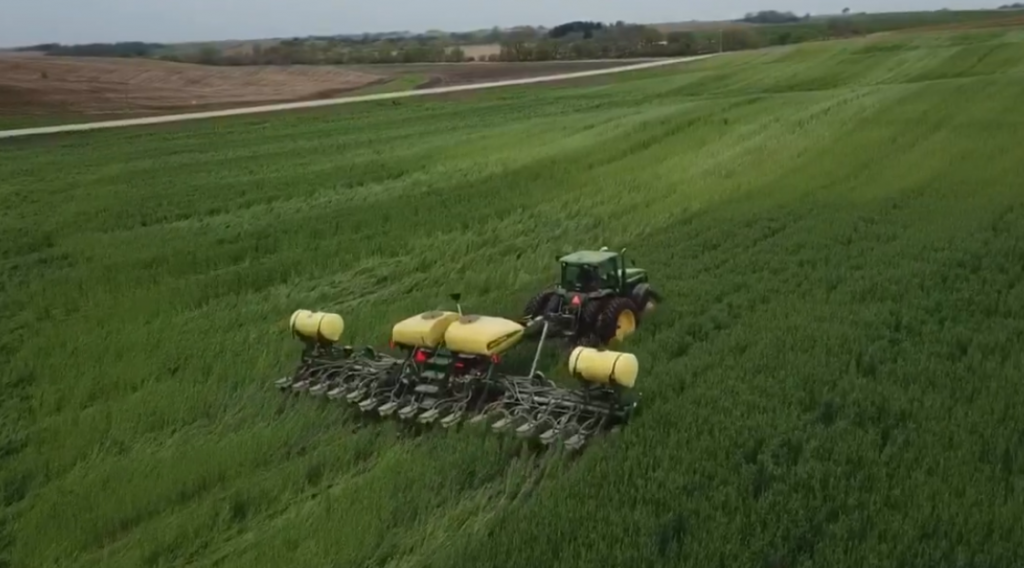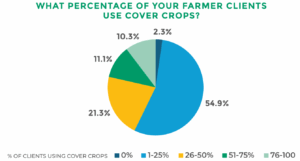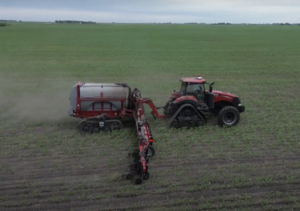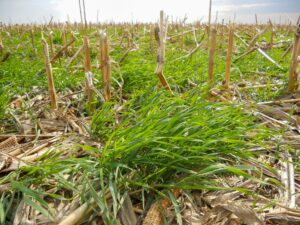By: 4R Plus
November 2020

Jasper County farmer Kyle Schnell returned to the farm in 2013 and searched for ways to improve profitability while adhering to the legacy of soil conservation passed down by his father, who passed away in 2006. His father began planting cover crops in the late ’90s, but before Kyle returned to the family farm the land was rented and there were periods where some tillage was done and cover crops weren’t seeded.
Schnell recalls his father teaching him cover crops and no-till controlled erosion on their rolling hills. He returned to those principles and expanded his soil health journey. To gain more knowledge, he joined the virtual community of farmers sharing how they implement 4R Plus practices.
“I watched – and still do – a lot of videos, especially during the winter,” Schnell said. “I feel an urgency to learn more. While I’m just in my early ’30s, I only have 40 attempts to grow a crop in my lifetime. Instead of doing one experiment a year, I started doing three or five.”
Schnell has transitioned 70% of the land to what he calls “regenerative organics.” “When I started doing more research about the benefits of cover crops, I realized I could reach a goal of being organic without the need of tillage,” he explained. “While a lot of organic farmers use tillage to control weeds, herbicide usage was already declining dramatically on the farm in just a few years.
“Once you start on the path of improving the soil you start to see its potential,” he said. “I did some custom grazing on cover crops and there were areas, because of the manure, where the rye was a foot taller. That showed me there is a lot of potential in my soil that is not being utilized.”

From a profitability standpoint, Schnell said there are multiple benefits of cover crops and no-till. “Not only have I reduced my synthetic inputs by 50% to 75%, cover crops are easily justified by the savings in herbicides alone,” he said.
In 2019, he experimented with an eight-species cover crop mixture to see if he could replicate the benefits, such as robust plant health, others talked about. “The cover crops on this field thrived because they produced different sugars in the soil,” he said. “You have to experience it yourself before you believe it. Now I’m a believer in crop diversity.”
Schnell encourages farmers in traditional corn-soybean rotations to do their own cover crop trials to add diversity to their soil. To further enhance soil diversity, he began experimenting with relay cropping and plans to expand this practice to more acres in 2021. “It’s another revenue source. I can harvest two crops in a year and multiply the soil health benefits,” he said.
He’s also participating in a program designed to profit from sequestering carbon from the soil. “You have to think outside the box and look for opportunities,” he said. “4R Plus practices can be used for multiple reasons; there’s multiple ways to implement them and they can also provide additional sources of revenue.
“I’m enjoying my soil health journey,” adds Schnell. “It’s rewarding to protect the land and improve the profitability of my farming operation.”
Have a question for Schnell? Click here.



